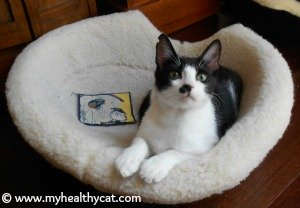A Flea-Free Environment
for Your Healthy Cat
"Keeping your cat's surroundings
flea-free will help you and your
cat in the long run."
Keeping Your Kitty's Environment Free of Fleas
Keeping a clean and flea-free environment for your cat is one of the best and most natural ways to keep fleas off of your cat and other pets.
Cleaning and vacuuming your home at least once a week, particularly in the areas your cat frequents, will interrupt the flea life cycle and greatly decrease the number of adult fleas that end up on your cat or kitten (or other pets).
A clean environment is particularly important for natural flea control in warmer months or if you live in a warm climate, as this is when the flea life cycle is more rapid.
Methods for keeping a flea-free environment for your cat are to lay down towels wherever your cat spends time and wash the towels weekly. This will get rid of any flea eggs or larvae that may be lurking.
Keeping Your Kitty's Bed Flea-Free
 Rufus in His Big Cat Bed
Rufus in His Big Cat BedKeep your cat's bedding clean by washing in hot, soapy water at least once a week. Drying the bedding on maximum heat will kill fleas in any part of their life cycle.
Be careful to roll up the bedding when taking it to the wash so that no fleas escape into other parts of your home.
Vacuuming for a Flea-Free Environment
If you already have a flea problem, you should vacuum your entire home, including furniture, and pay particular attention to the areas your cat frequents (e.g., her bed or kitty condo). You should do this every day until you have a clean and flea-free environment. Vacuuming will pick up the flea eggs, larvae, and the flea "dirt" that flea larvae feed on.
After you finish vacuuming, empty the vacuum cleaner bag (or contents of the vacuum if you use a bagless vacuum) in the outside trash. The eggs can easily hatch in the bag and you don't want them to escape right back into your home.
You can also put a flea collar, or part of a flea collar, in
the vacuum bag to kill any adult fleas that may have been vacuumed up.
Be sure to throw out the bag if you use a flea collar. This will prevent
spreading the toxicity of the flea collar chemicals around your home
through the vacuum exhaust.
Mop uncarpeted floors to pick up all the flea dirt that may escape your broom and prevent a clean and flea-free environment.
Yes, this is a lot of work! Unfortunately, this is what it takes to get rid of all the fleas. Even one flea can lay enough eggs to lead to an infestation, so you need to get them all.
Steam Cleaning Your Cat's Environment
Steam cleaning your carpets at the beginning of the flea season in your area, or whenever you begin a flea control program, will kill the flea eggs in your home and keep them from hatching. This is an expensive option, but effective.
Professional carpet treatments help to achieve a clean and flea-free environment. They can be used as a preventative measure and also as treatment if you already have an infestation.
Ingredients used in professional carpet treatments include sodium polyborate, sodium tetraborate, or sodium borate. These are highly effective and often come with a year-long guarantee.
Do-It-Yourself Carpet Treatment
Products used by professional flea exterminators for carpet treatment are also available for you to apply by yourself. Fleabusters Rx is the brand used by many professional exterminators. You can apply the powder yourself to eliminate fleas in your home (and save money!).
Be sure to follow the directions exactly and only use products that are safe for your cat and other pets.
Never use a laundry-grade borax. This is poison to your cat and can cause serious health problems.
Fogging Your Home
If your flea problem is particularly severe, you may choose to use a fogger to try to achieve a flea-free environment. You should remove your cat and other pets from your home while you do this.
Also, be sure that the fogger you choose is 100% safe for your cat and other pets and that it kills adult fleas, eggs, and larvae.
Keep Your Yard Safe, Too
If your cat goes outside, or lives with another animal that spends time outdoors, you may need to use a yard spray to prevent a potential flea problem from moving into your home.
Or you could use diatomaceous earth to eliminate the fleas in your yard.
Use the Search Box to find more feline info. |
From Flea-Free Environment to My Healthy Cat home
If you suspect your cat is ill, please contact your veterinarian immediately.
The material presented in this site is for informational and entertainment purposes only. It is not intended to replace your veterinarian's advice.
Copyright 2003-2023 © www.myhealthycat.com
Sitemap | Contact Us | About Us | Disclosure | Privacy Policy

